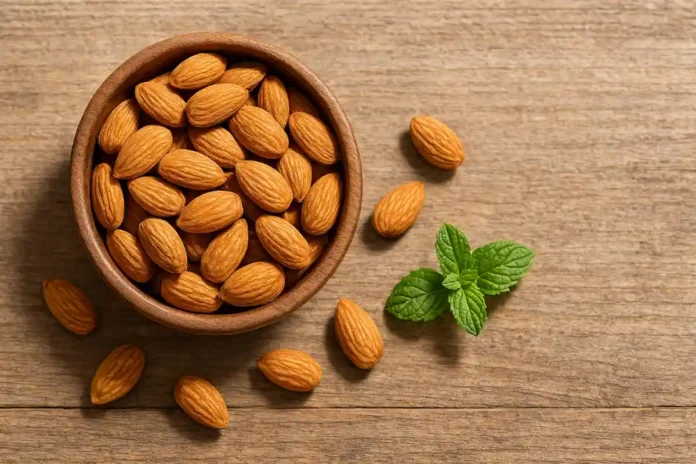A new study highlights that eating almonds daily may do far more than boost brain and heart health – it can actually help protect your DNA and strengthen the body’s natural defence systems. Researchers found that almonds reduce oxidative stress, a harmful process linked to aging, cancer, and chronic disease.
Almonds are naturally rich in vitamin E, magnesium, fiber, antioxidants, and healthy fats, making them a true functional food for long-term wellness.
📊 What the Study Found
The research, published in Scientific Reports, observed that consuming more than 60 grams of almonds daily significantly lowered biomarkers of oxidative stress such as MDA (malondialdehyde) and 8-OHdG (8-hydroxy-2′-deoxyguanosine).
👉 Participants who ate almonds daily also showed improved antioxidant enzyme activity, meaning their cells were better able to fight free radicals and repair damage.
⚡ How Almonds Protect Your DNA
Oxidative stress occurs when your body produces more reactive oxygen species (ROS) than it can neutralize with antioxidants. Over time, this imbalance damages DNA and cells, paving the way for serious diseases like cancer, diabetes, and heart disease.
Almonds help counteract this because they contain:
- Vitamin E – a potent antioxidant that shields cell membranes
- Flavonoids & polyphenols – plant compounds that neutralize free radicals
- Healthy fats – supporting brain and heart function
- Magnesium – vital for over 300 enzymatic reactions, including DNA repair
Together, these nutrients form a cellular defence system, keeping your DNA and cells healthier for longer.
🥜 Why 60 Grams is the “Magic Number”
Scientists say 60 grams (about 40–45 almonds) daily is the sweet spot for maximum benefit. While smaller amounts are still healthy, the study showed that crossing this threshold triggers stronger antioxidant activity, lowering DNA damage markers significantly.
This amount may:
- Reduce lipid peroxidation (damage to fats in cells)
- Enhance DNA repair mechanisms
- Boost antioxidant defences naturally
🍽️ Easy Ways to Add 60g Almonds to Your Diet
Eating 40–45 almonds at once may sound like a lot, but you can split them throughout the day:
- Roast almonds lightly with ghee & pink salt for a crunchy snack
- Blend almonds or almond butter into smoothies
- Add chopped almonds to oatmeal, yogurt, or cereal bowls
- Spread almond butter on whole-grain toast
- Mix almonds with other nuts and seeds for a trail mix
- Sprinkle grated almonds over salads, curries, or stir-fries
❤️ Other Health Benefits of Almonds
Beyond DNA protection, almonds offer a wide range of benefits backed by research:
- Help control blood sugar – low-carb, high-fiber, and rich in magnesium
- Lower blood pressure – magnesium supports vascular health
- Reduce LDL cholesterol – lowering heart attack and stroke risk
- Support weight management – protein and fiber promote satiety
- Improve skin health – vitamin E combats UV damage and aging
FAQs About Almonds and DNA Protection
Can I eat more than 60 grams of almonds daily?
Yes, but moderation is key. Eating too many may add excess calories, leading to weight gain. Stick to 40–60 grams daily for balanced benefits.
Should I eat raw or roasted almonds?
Both are healthy. Light roasting preserves most antioxidants, but avoid heavily salted or sugar-coated almonds.
Can almond milk or almond butter offer the same benefits?
Yes, if consumed in equivalent amounts (around 2–3 tbsp almond butter). However, almond milk usually has fewer almonds per serving.
Do almonds need to be soaked before eating?
Soaking almonds overnight can make them easier to digest and may improve nutrient absorption, especially of vitamin E and antioxidants. However, even raw, unsoaked almonds provide significant health benefits, so it comes down to personal preference.
🌟 Key Takeaway
Almonds aren’t just a snack – they’re a nutritional powerhouse that can protect your DNA, reduce oxidative stress, and support heart, brain, and metabolic health. Just a daily handful (around 40–45 almonds) could be one of the simplest steps toward long-term wellness.
